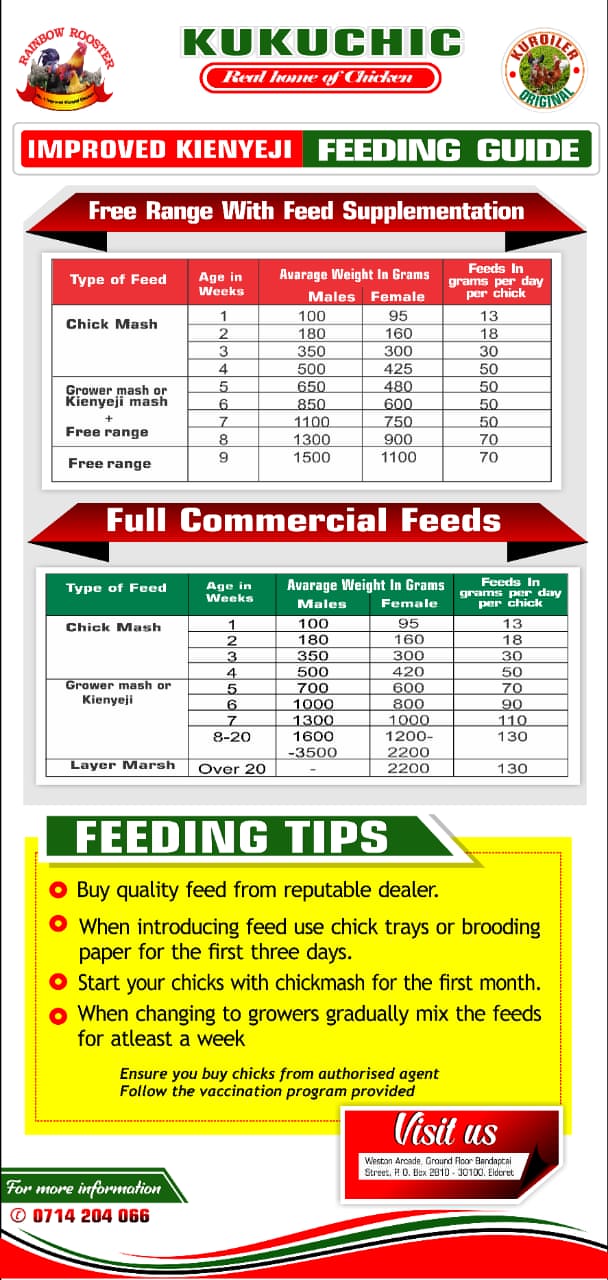Feeding chicken is of importance in order to increase the production of meat and eggs. It is very important that you buy the right kind of feed for your chicken don't give chicks feed meant for the adults because it contains high calcium that causes irreversible kidney damage and too low protein that a fast-growing chick needs. A lack of feed and water will reduce resistance to diseases, parasites, and mortality
There are three key things chicks need for survival;
- Warmth
- water
- Feed
"Chakula bora si Bora chakula"
Depending on the age and breed of bird nutrient requirements varies hence there are different types of feeds
- Chick diet: High in protein offered up to 4weeks
- Growers diet; medium in protein offered from 5th week to the point of lay
- Layers diet: lower in protein offered after a 10% lay onwards
First things first chicken need access to fresh clean water which plays a key role in chicken overall health and well being and aid in most of its body functions
Chicks and mature chickens alike consume double the amount of water as compared to feed and therefore, a lack of it can affect chickens health
Next to water, protein is the second most essential nutrient for young chicks it stimulates the growth of muscles, tissues, and organs it is also needed for general production and optimal health. Protein sources form less than 20% of poultry diet due to their high cost, they are classified into two categories plant source and animal sources
. Plant sources include; Animal and insects
- cottonseed cake blood meal
- soya meal fish meal
- sunflower meal bone meal
- peanut meal maggots
- beans termites
- oil cake worms and insects
N/B feel free to offer your chicken some small worms that make homemade protein.
Carbohydrates/ Energy sources they include; maize, millet, sorghum, maize bran, pollard, wheat bran, maize germ, roots and tubers
- They are generally for maintenance eg body temperature, vital functions, and exercise
- Forms over 75% of the poultry feed
Minerals are classified as macro and micro minerals depending on the levels needed in the diet. macro minerals include calcium phosphorus, chlorine magnesium, and sodium.
Micro minerals play an essential role in the body's metabolism they include: copper, iodine, iron, manganese, selenium, and zinc.
Generally, minerals help in bone and egg formation and optimal health status. Calcium and phosphorus are the most important minerals in the ratio of 2:1
Vitamins are a group of organic compounds that poultry only requires in small quantities. Vitamins are divided into two categories fat-soluble and water-soluble. They are essential for normal body functions, growth, reproduction, and also important for optimal health status. Important vitamins are A, B2and D. Deficiency of one or more vitamins can lead to a number of diseases or syndromes.
There are other non-nutrient substances that are necessary for chicken eg; Grits and growth promoters
DO and Don'ts
- Do make sure that chicks get access to fresh clean water at all times
- Don't be tempted to cut corners and provide water in an open dish or saucer
- Do clean Waterers always
- Do make sure chicks are drinking before they get to feed
- Don't feed layer ration to chicks, not even as an emergency measure
- Do sprinkle little Chick starter mash on newspaper only for first 3 Days
- Do choose a good feeder that works well for your space
